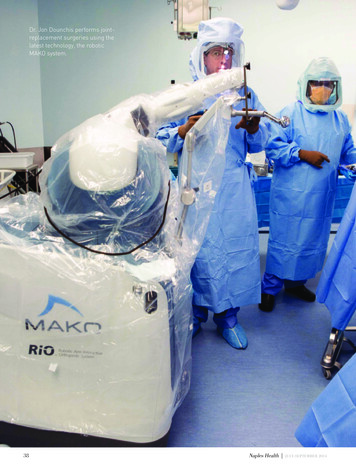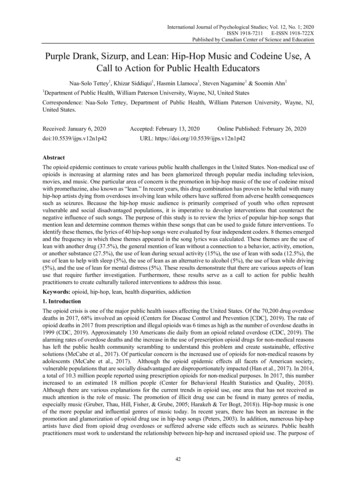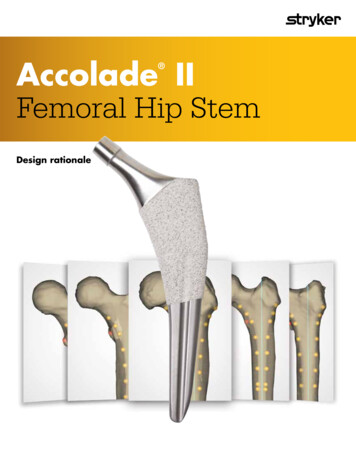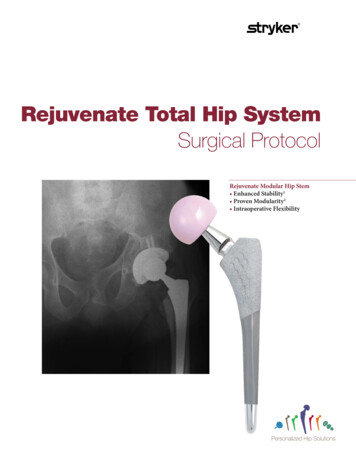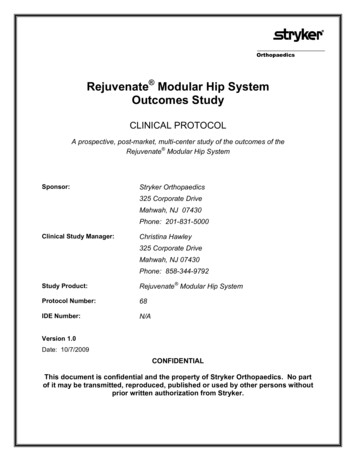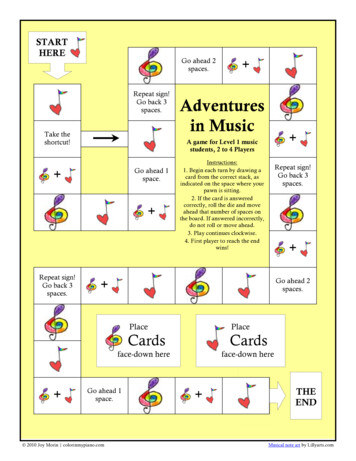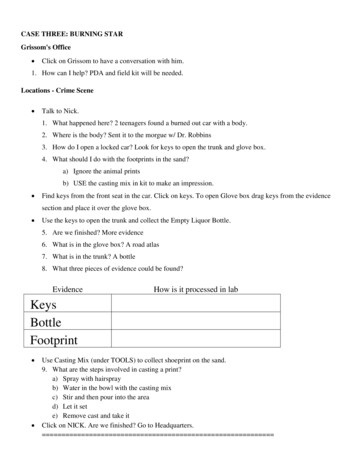
Transcription
Joint AdventuresHip Replacementat Northwestern Medicine Central DuPage Hospitaland Northwestern Medicine Delnor Hospital
Table of contentsGetting StartedHealth and NutritionAbout your hip. . . . . . . . . . . . . . . . . . . . . . . . . . . 4Calcium . . . . . . . . . . . . . . . . . . . . . . . . . . . . . . 14Arthritis. . . . . . . . . . . . . . . . . . . . . . . . . . . . . . . 5Vitamin D. . . . . . . . . . . . . . . . . . . . . . . . . . . . . 16Hip replacement. . . . . . . . . . . . . . . . . . . . . . . . . . 5Pre-operative requirements. . . . . . . . . . . . . . . . . . 6Day of SurgeryArrival and parking. . . . . . . . . . . . . . . . . . . . . . . 18Preparing for SurgeryCheck-in and registration. . . . . . . . . . . . . . . . . . . 18Physician visits and lab tests. . . . . . . . . . . . . . . . . 8Waiting room. . . . . . . . . . . . . . . . . . . . . . . . . . . 18Dental care. . . . . . . . . . . . . . . . . . . . . . . . . . . . . 8Recovery room . . . . . . . . . . . . . . . . . . . . . . . . . 18Infection prevention. . . . . . . . . . . . . . . . . . . . . . . 8Food and fluids. . . . . . . . . . . . . . . . . . . . . . . . . 20Health history. . . . . . . . . . . . . . . . . . . . . . . . . . . 9Visitors . . . . . . . . . . . . . . . . . . . . . . . . . . . . . . 20Pre-op Clinic at Central DuPage Hospital. . . . . . . . . . 9Privacy. . . . . . . . . . . . . . . . . . . . . . . . . . . . . . . 20Pre-admission tesing at Delnor Hospital. . . . . . . . . . 9Surgery time. . . . . . . . . . . . . . . . . . . . . . . . . . . 10What to bring for your hospital stay. . . . . . . . . . . . 10Are you covered?. . . . . . . . . . . . . . . . . . . . . . . . 11Care coordination. . . . . . . . . . . . . . . . . . . . . . . . 11Home health care. . . . . . . . . . . . . . . . . . . . . . . . 11Choosing a coach. . . . . . . . . . . . . . . . . . . . . . . . 12Your Hospital StayPost-surgery. . . . . . . . . . . . . . . . . . . . . . . . . . . 22Inpatient physical therapy. . . . . . . . . . . . . . . . . . 22Bladder and bowel care. . . . . . . . . . . . . . . . . . . . 22Incision care. . . . . . . . . . . . . . . . . . . . . . . . . . . 23Respiratory care. . . . . . . . . . . . . . . . . . . . . . . . 23Circulation . . . . . . . . . . . . . . . . . . . . . . . . . . . . 23Continued 1
Managing Your PainDressing. . . . . . . . . . . . . . . . . . . . . . . . . . . . . . 38Comfort-function goal. . . . . . . . . . . . . . . . . . . . . 26Toileting. . . . . . . . . . . . . . . . . . . . . . . . . . . . . . 39Bathing/showering. . . . . . . . . . . . . . . . . . . . . . . 40Discharge InstructionsHome precautions . . . . . . . . . . . . . . . . . . . . . . . 41Discharge instructions for hip replacement. . . . . . . 28Adaptive equipment. . . . . . . . . . . . . . . . . . . . . . 42Incision care. . . . . . . . . . . . . . . . . . . . . . . . . . . 29Infection prevention. . . . . . . . . . . . . . . . . . . . . . 30Outpatient Physical TherapyDental care. . . . . . . . . . . . . . . . . . . . . . . . . . . . 30Outpatient rehabilitation services. . . . . . . . . . . . . 44Urological care. . . . . . . . . . . . . . . . . . . . . . . . . . 30Pain management during physical therapy . . . . . . . 45Colonoscopy. . . . . . . . . . . . . . . . . . . . . . . . . . . 30Exercises. . . . . . . . . . . . . . . . . . . . . . . . . . . . . 46Deep vein thrombosis (DVT). . . . . . . . . . . . . . . . . 31Pulmonary embolism. . . . . . . . . . . . . . . . . . . . . . 31Leaving the HospitalDischarged. . . . . . . . . . . . . . . . . . . . . . . . . . . . 32Safety PrecautionsTransfers. . . . . . . . . . . . . . . . . . . . . . . . . . . . . 34Stairs. . . . . . . . . . . . . . . . . . . . . . . . . . . . . . . . 372
Joint Adventures NeurologyGetting Started35
Joint Adventures Getting StartedGetting startedTo help you better understand theprocess of hip replacement, it may behelpful to have an understanding ofwhat a hip is and how it works.Your hip is a simple ball and socket joint where your thighbone (femur) joins your pelvis (the acetabulum). Theacetabulum is lined with cartilage, which cushions thebones and allows the joint to rotate smoothly withminimal friction.Smooth weightbearing surfacesSocketBallSmoothcartilagePelvisThigh bone4
Joint Adventures Getting StartedIrregularweight-bearingsurfacesBone spursNarrowed joint spaceWorn cartilageRough boneArthritisHip replacementArthritisThe word “arthritis” means joint inflammation. Arthritis ofthe hip is a disease that wears away the cartilage of thehip joint. Without an adequate layer of cartilage, the femurand the acetabulum rub on each other, bone on bone.When this happens, the joint becomes pitted and rough.The result is pain, stiffness and instability.arthritis, the joint fluid contains chemical substancesthat attack the joint surface and damage it. Swelling, painand stiffness are usually present even when the joint isnot used.There are many different types of arthritis. One major typeis osteoarthritis, which is sometimes called degenerativejoint disease. It is most common in people over age 50, butcan occur at any age, especially if the joint was damagedearlier in life. Large weight-bearing joints such as the hipand knee are the most common joints affected. Peoplewith osteoarthritis often develop bone spurs around thejoint that can also limit motion.Hip replacementThe purpose of hip replacement surgery is to remove thedamaged and worn parts of the hip and replace them withartificial parts called prostheses that make the hip strong,stable and flexible again. The prosthesis has the same basicparts as your own hip. In most cases, the implant willconsist of two pieces: the femoral component, a metalshaft with a ball that is inserted into the thigh bone; andthe acetabular component, a metal and polyetheylenecup that is inserted into the pelvis.Rheumatoid arthritis is a chronic disease that can attackmany parts of the body, including the joints. In rheumatoid5
Joint Adventures Getting StartedCongratulations.You’ve taken the firststep to regaining youractive lifestyle.However, you need to take a few more to ensure you, yourhome and your caregiver are fully prepared for your jointreplacement surgery.Pre-operative classThe class and this book were specially created to helppatients and family members better understand whatto expect before and after joint replacement surgery.Steps to prepare for the pre-operative class1. Bring this book with you to class and to the hospitalthe day of your surgery.2. Select a family member or close friend who can be your“support person” (coach); your support person will needto attend the pre-operative class with you to learn andunderstand how to assist you.3. Register for class two to six weeks prior to yoursurgery by calling the Information and PhysicianReferral Line at 630.933.4234; TTY for the hearingimpaired 630.933.4833.During the next few days and weeks, you will need to:Register and attend a pre-operative hip replacementclass at the hospitalPrior to your surgery, we recommend you watch anyweb-based programs that have been assigned to you.Watch educational internet programs as assignedPrepare your home for your returnComplete lab work or other tests ordered byyour physicians*Select a support person to assist you at home forthe first week after surgery*In the spirit of keeping you well-informed, some of the physician(s) and/or individual(s) identified, are neither agents nor employees of Northwestern Memorial HealthCare or anyof its affiliates. They have selected our facilities as places where they want to treat and care for their private patients.6
Joint Adventures NeurologyPreparingfor Surgery7
Joint Adventures Preparing for SurgeryPreparing for surgeryJoint replacement is anelective surgery. Therefore,it is important that yourstate of health be evaluatedthoroughly prior toundergoing the procedure.Physician visits and lab testsBefore surgery, most patients will complete an evaluationthat may include a pre-operative physical exam, labtests, EKG and X-rays. Please be sure to speak with apre-admission review nurse before you go for testing;anesthesia guidelines may call for additional tests.Your physician* also may discuss temporarily stoppingthe use of some medications, such as aspirin or otheranti-inflammatory medications, about one week priorto surgery. These medications tend to make your bloodthinner and could cause more bleeding during your surgery.Dental care before surgeryAny invasive dental work, including routine cleanings,cavity filling, extractions, root canals or implant work,can introduce bacteria into the bloodstream. If you arescheduled to have dental work within the six weeksprior to your joint replacement surgery, please tell yoursurgeon’s* office staff. Your surgeon* may providespecific instructions or guidelines for you to follow.Consult your surgeon* regarding the length of time towait after surgery before scheduling any futuredental appointments.Infection preventionInfection is a rare complication of joint replacementsurgery. If you have any signs or symptoms of infectionprior to surgery such as an open sore, flu symptoms,a cut, infected teeth or a bladder infection, tell yourphysician immediately. Your surgery may need to bedelayed until you receive appropriate treatment.While in the hospital, you will receive antibiotics beforeand after surgery to reduce your risk of infection.If you have any signs or symptoms ofinfection prior to surgery, tell your physician*immediately.*In the spirit of keeping you well-informed, some of the physician(s) and/or individual(s) identified, are neither agents nor employees of Northwestern Memorial HealthCare or anyof its affiliates. They have selected our facilities as places where they want to treat and care for their private patients.8
Joint Adventures Preparing for SurgeryCommon infections include sore throat, urinary tractinfection, deep cuts or an ear infection. Your physician*may prescribe antibiotics.Pre-op Clinic at Central DuPage HospitalYou are encouraged to attend the Pre-op Clinic prior tothe day of surgery. You will meet with a member of ourPerioperative Nursing Team. One of our registered nurseswill complete a nursing assessment, review surgicalconsents, review home medications and provide pre- andpost-operative education. The Pre-op Clinic also providespatients the opportunity to ask questions in personand become familiar with the hospital before surgery.If the clinic nurse has a concern, or upon request, ananesthesiologist* may meet with you during your Pre-opClinic visit.Health historyOnce you have a confirmed surgery date, you will need toprovide a complete health history. One of our experiencedpre-admission nurses will call you to obtain your detailedhealth history.Appointments for the Pre-op Clinic will be made by amember of the Pre-admission Testing Department whenyou are contacted for your health history. You maycomplete the pre-op testing during your visit to the Pre-opClinic. Please allow 45 minutes to one hour for the visit.After the phone interview you will be given instructionsfor the next steps (i.e. what tests will be performed,where to go for testing, etc.). Based on your history,required testing will be scheduled at the Pre-op Clinic atCentral DuPage Hospital, the Pre-admission Testing Clinicat Delnor Hospital or one of our Northwestern MedicineConvenient Care centers.Pre-admission Testing Clinic at Delnor HospitalYour incision needs to be kept clean and dry until it ishealed. Your new joint is artificial and does not haveyour body’s natural protection against infection, so it ispossible to develop an infection years later. Bacteria canenter your bloodstream and invade your new joint causingit to become loose and painful. Call your physician*immediately if you experience signs or symptoms ofinfection such as fever, chills, pain, redness or drainage.You will meet with a member of our Pre-admissionNursing Team. One of our nurses will draw blood for labsand other testing, if required. The nurse will provide anypre-operative education. During this time, one of ouranesthesiologists will meet with you. The Pre-admissionClinic also provides you the opportunity to ask questionsin person and become familiar with the hospitalbefore surgery.*In the spirit of keeping you well-informed, some of the physician(s) and/or individual(s) identified, are neither agents nor employees of Northwestern Memorial HealthCare or anyof its affiliates. They have selected our facilities as places where they want to treat and care for their private patients.9
Joint Adventures Preparing for SurgeryWhen is my surgery?We will be able to confirm your surgical time after 2 pmthe business day before your scheduled procedure. Amember of the Surgical Services staff will call you andtell you when to arrive and also inform you of any day-ofsurgery tests that have been ordered.For patients at Central DuPage HospitalIf you will not be home, or you miss our call, please contactus at 630.933.2647 after 5 pm, Monday through Friday, toconfirm your surgery time. TTY for the hearing impaired630.933.4833.For patients at Delnor HospitalIf you will not be home, or you miss our call, please contactus at 630.208.4038 after 5 pm, Monday through Friday,to confirm your surgery time. TTY for the hearing impaired630.933.4833.What to bring to the hospitalAlthough you’ll be in the hospital for a few days, you don’tneed to pack much. In fact, we recommend you pack aslightly as possible.Here is a suggested list of what to bring tothe hospital:Insurance and Medicare cardsA list of all your known allergies (medication, foodand environmental) and a description of your allergicreactions to eachToiletries: toothbrush, toothpaste, comb, brush,deodorant, lotion, contact case or eye glass case,denture case, etc.Your CPAP mask if you use one at night whenyou sleepList of any special dietary requirementsWhen you call, you will be told:What time you need to arrive at the hospitalUnderwear, socks, loose comfortable pants or shorts,button-down shirts, and shoes to wear duringtherapy. (These can be the same clothes you wear tothe hospital the day of surgery.)What time to stop eating and drinking the nightbefore surgeryThis book and any materials provided to you byyour surgeon*Your scheduled surgery timeWhat medication(s) you are to take, if any, themorning of surgery, including insulin and anymedications you should bring with you to the hospitalThe “Do Not” list:Do not wear makeup the day of surgeryDo not bring cash or personal items such as jewelry oritems of great value*In the spirit of keeping you well-informed, some of the physician(s) and/or individual(s) identified, are neither agents nor employees of Northwestern Memorial HealthCare or anyof its affiliates. They have selected our facilities as places where they want to treat and care for their private patients.10
Joint Adventures Preparing for SurgeryAre you covered?Healthcare insurance is ever-changing. We suggest youcall your insurance provider to discuss your coverage. Itis much easier to plan for services and care when youknow in advance what your insurance covers and whatit doesn’t.Care CoordinationTwo to four weeks before your surgery, you will becontacted by a nurse to discuss a discharge plan designedto promote a safe and successful outcome.You will receive a call from either a pre-procedurecase management nurse or from the orthpaedic nursenavigator.Northwestern Medicine Home Health & HospiceIf you are discharged to your home, you may needvisits from a home health nurse and physical therapist.Northwestern Medicine Home Health & Hospice offers ajoint replacement program designed to provide you withexcellent care after your joint procedure. These servicesare available immediately after surgery and continueuntil you make the transition to outpatient therapy.Northwestern Medicine Home Health cares for morethan 150 joint replacement patients each month, and isdedicated to maximizing your potential and providing theeducation required to minimize complications.Northwestern Medicine Home Health post-surgery careNorthwestern Medicine Home Health is just one of thechoices you have for post-discharge care. If you do nothave Medicare, we recommend you check with yourinsurance provider to see which agencies are in yournetwork of providers.A Northwestern Medicinecare coordinator (dischargecoordinator) will help makethe final arrangementswith the home health careprovider of your choice.Before you go home, a Northwestern MedicineHome Health liaison can:Meet with you during your hospital stay and beavailable to answer any questions you may haveregarding home careReview all pertinent information regarding yourmedical history, surgical procedure and post-operativecare and report it to your home health teamIdentify and order needed equipmentIf you would like to speak with a Northwestern MedicineHome Health representative prior to surgery to discusspost-discharge care, call 630.665.7000 or visit thewebsite at www.nm.org/homehealth.11
Joint Adventures Preparing for SurgeryAfter you go home, Northwestern Medicine HomeHealth can provide the following services:A registered nurse will assess your overall health,review medications and comfort level, and evaluatethe surgical incision.The nurse and therapist will tailor a home programto meet your specific needs. It will include physicaltherapy and occupational therapy if needed.We will conduct a home safety evaluation and makerecommendations for making your environment saferduring recovery.Lab work will be performed as ordered to monitorblood-thinning medications. Results will be reportedto your physician.*When it is time for you to start outpatient therapy,we can provide assistance in determining your needsand preferences.We will communicate regularly with your physician.*Choosing a coachAs you prepare for surgery, another important thingto decide is who will be your coach or supportperson once you’re home. This can be a family member orfriend. Whomever you choose should plan to attend thepre-op class with you, watch any assigned web-basedprograms and help prepare your home. Most important,they need to be with you at least the first week afteryou return home. You may need assistance with mealpreparation and daily activities. Your coach also willencourage and remind you to do your home physicaltherapy exercises.Northwestern MedicineHome Health & Hospice(formerly CNS Home Health & Hospice)690 East North AvenueCarol Stream, Illinois 05924-hour phoneTTY for the hearing impairedReferralsFaxnm.org/homehealth*In the spirit of keeping you well-informed, some of the physician(s) and/or individual(s) identified, are neither agents nor employees of Northwestern Memorial HealthCare or anyof i
that may include a pre-operative physical exam, lab tests, EKG and X-rays . Please be sure to speak with a pre-admission review nurse before you go for testing; anesthesia guidelines may call for additional tests . Yo



